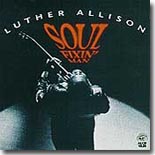|
Luther Allison
Soul Fixin' Man
Alligator Records
|

Despite a well-received appearance at the 1969 Ann Arbor Blues Festival,
and several national tours, which eventually led to his signing with
Motown Records in 1972, by the mid ’70s Luther Allison was
frustrated with the machinations of the recording world, as well as the
general decline in the popularity of the blues in the U.S. Allison
decided to relocate to France in 1977 after touring Europe several times
during the '70s and enjoying the warm reception he received everywhere
he played. By relocating overseas, Allison followed in the footsteps of
other blues expatriates like Memphis Slim and Eddie Boyd.
During his time in Europe, Allison toured endlessly and released no
fewer than 10 albums, only a few of which were available in the U.S. at
the time. His stage performances, often consisting of three to four hour
shows featuring lengthy guitar solos and Allison's tireless showmanship,
quickly became legendary.
In 1994, Allison's friend and agent Thomas Ruf formed the Ruf Records
label, strictly to release Allison's albums. For their initial foray
into the record business, Ruf Records released Bad Love. Bruce
Iglauer’s Alligator Records handled the North American distribution of
the album, renamed Soul Fixin‘ Man. Iglauer and Allison went way
back, to the late ‘60s when Iglauer was employed at Delmark Records
during Allison’s brief stint with the label. Allison’s highly charged
mix of blues, rock, soul, and funk definitely fit the motto of Alligator
Records, “Genuine Houserockin’ Music.”
The opening cut, “Bad Love,” is one of Allison’s trademark tunes and
shows the influence of B. B. King on Allison’s writing and playing
style. I was always surprised that King never covered this tune, but to
be honest, Allison’s version is so on the money that any other efforts
would definitely fall short (though Allison’s son Bernard made as game
an effort as anyone with his cover version, which remains a staple of
his live shows). There simply could not have been a more appropriate
opening cut than “Bad Love,” and it would have been easy for the rest of
the album to not measure up to its opening cut. Thankfully, that was not
the case.
The funky “I Want To Know,” written by Sugar Pie DeSanto, Ron Badger,
and Bob Geddins, keeps things percolating along, with some deft keyboard
work by Ernest Williamson and a great guitar break from Allison. Then
things heat up again with the autobiographical title cut (Allison
trained as a shoe maker and repairman prior to taking up music), which
features more scorching fretwork. “Middle of the Road” is not
particularly noteworthy as a composition, but Allison’s soloing nearly
pulls the song off.
Allison’s R&B chops are on full display for a stylish cover of Mosley &
Johnson’s “She Was Born That Way,” and he gives another bravura vocal
performance on the low-key “Gave It All.” “You Been Teasin’ Me” is a
loose, funky arrangement with a few soaring guitar licks thrown in for
good measure, and “Nobody But You” gives Allison an opportunity to show
his slide guitar prowess, an underrated facet of his guitar work.
“Put Your Money Where Your Mouth Is” features more tantalizing keyboard
from Williamson, and segues into one of the album’s most surprising
tracks, a stunning cover of “The Things I Used To Do.” Allison,
accompanied only by Williamson’s churchy organ, recreates the Guitar
Slim classic into a vocal tour de force of regret and hope. The
suggestive “Love String,” another Mosley/Johnson composition, gets the
full R&B treatment complete with female back-up singers and the Memphis
Horns (who appear on several other tracks, including “Bad Love”). Had
Allison never picked up a guitar, it would have been easy to see him
hitting it big as a soul singer.
The closing track, “Freedom,” is a change of pace for Allison. Featuring
African rhythm instruments and Another Blessed Creation Choir, it’s a
song about the plight of oppressed people throughout the world and how
everyone deserves the right to be free. Though the South African
references were a bit dated by the time of the album’s release, it’s
still a poignant track and still timely in many ways.
Backing Allison on the disc was the James Solberg Band, with Solberg
providing reliable backing on rhythm guitar, along with Williamson on
keyboards and the powerful rhythm section of Dave Smith (bass) and James
Robinson (drums). The always dependable Jim Gaines served as producer.
Soul Fixin’ Man was a ground-breaking release for Allison. He
carried home a box load of Handy Awards in 1995 and was able to tour
non-stop for the next few years, this time in the U.S. as well as
Europe, building a huge following of loyal fans, and finally gaining
some hard-earned recognition as one of the premier blues artists of his
time. He was also able to release two more studio albums for Alligator,
both earning their share of Handy's as well. Sadly, just after the
release of his third Alligator album, Reckless, Allison fell ill
and was diagnosed with lung cancer in July during his 1997 tour and died
just a month later, just a few days before his 58th birthday. At least
he was able to experience success in his own country before his death.
Fortunately for blues fans, Luther Allison left a remarkable legacy of
recordings, including most of his European releases now made available
in the U.S., thanks to Ruf Records, DVDs of his unbelievable
performances, and most importantly, his son Bernard Allison, who has
made his own mark as a first-rate blues guitarist. If you have not
experienced Luther Allison, Soul Fixin’ Man is the place to
start.
--- Graham Clarke